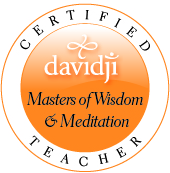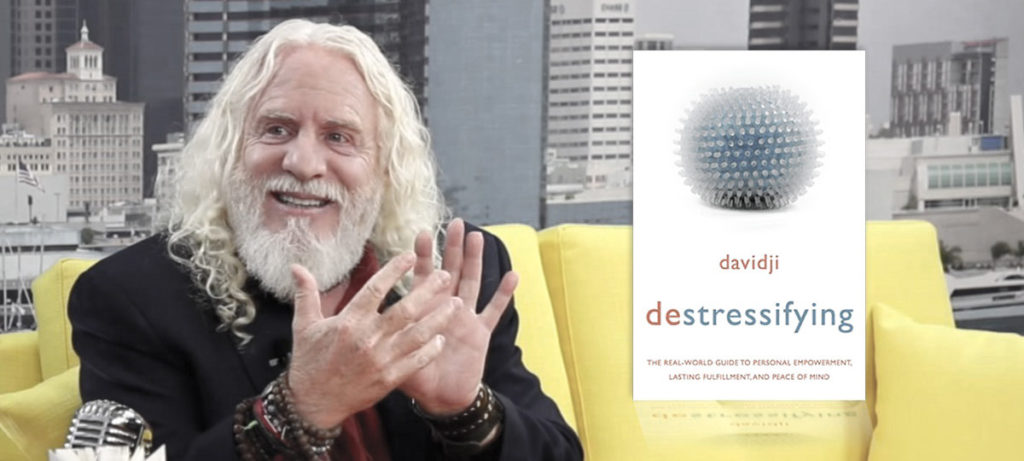“90 percent of our physical toxicity is emotionally derived.” —David Simon, MD
Welcome, Spiritual Warriors, to this week’s edition of The Source on what stress does to your mind.
A couple weeks ago we examined the body’s ancient fight-flight response. I talk about it regularly because stress is such an important topic in our society, and I want you to know that not all stress is bad. That’s right!!! There’s a difference between good stress and bad stress (or eustress, as researchers call it), and learning to master stress and turn it into a positive response for your bodymind is the key to making more mindful decisions.
Since you’re not facing a physical threat at this very moment (I hope!), your bodymind isn’t triggering the fight-or-flight biological stress response. But you could very easily invoke it in reaction to not getting to work on time, being misunderstood, misplacing our phone, being challenged, getting caught in a lie, getting stuck in traffic, losing our keys, losing out on an opportunity, missing a deadline, and so on. When our sense of self (our ego) is challenged, the ego response is the most common biological stress response—and carries with it the same physiological reaction as fight-or-flight.
The ego is the realm of I, me, mine—it’s our sense of self, our sense of ownership of people, things, and experiences. When that ownership is questioned or one of our boundaries is contested or attacked, we lash out to defend it or shut down in resignation. Think of all the things you feel as though you own: your house; your car; your school; your city, state, town, and maybe your country; your partner; your kids (get over that one now); your company; your religion; your office, your neighborhood; your clothes; your TV channel; your musical group; your favorite song; your phone; your shoes; your sport, your athlete, and your team; your show; your actor, writer, or teacher . . . get the point?
You may have attachments to—and deep fondness
for all these other things in your life, but you don’t really own them. Ask yourself right now, What do I really own?, and let the answers flow for a few moments.
Our Spectrum of Emotions
The ego response has the whole spectrum of fight-flight reactions woven into its emotional expressions. The fight version of the ego response may manifest as reactive, angry, argumentative, caustic, aggressive, or abrasive behavior. The flight version of the ego response can be expressed by emotionally closing down, biting your tongue, throwing your hands up, shutting someone out, or withdrawing, such as refusing to converse with another person or giving them only terse replies.
You have shut down to escape the threat—except you haven’t escaped it. You’re marinating in it! More extreme forms of emotional flight are expressed through non-nourishing escapist behaviors, which you can read more about in my book destressifying. The emotional responses to stress are well documented. Here are just a few of the ways we respond when our needs aren’t met or when we detect a threat to our sense of self:
- Harsh or defensive attitude
- Sarcasm or shutdown
- Impatience and reactivity
- Unclear and knee-jerk thinking
- Overwhelm and procrastination
- Surges of anxiety or depression
This emotional version of the fight-or-flight response is triggered by your autonomic nervous system as you detect a threat to the boundaries of your ego, creating the exact same physiological self-preservation reactions outlined in destressifying. When the ego or reactive stress response kicks in, this is what your body does:
- You start to breathe more
- Your blood pressure and your pulse begin to stress your
- Blood rushes into the muscles in your arms and legs.
- Your stress hormones (adrenaline, cortisol, glucagon)
- Your blood sugar
- Blood leaves your digestive tract, so you stop digesting.
- Your growth hormone and sex hormones
- Your immune system shuts
- Your platelets become plump and sticky, thickening your
Sound familiar?
Reaching for SODA
There’s a powerful tool I have taught to thousands of highly pressured businesspeople on their way to living a destressified life. I’d love for you to join the club. The tool is called Reaching for SODA. I know. It sounds kooky, but it’s highly effective in preventing you from blurting out that harsh, unkind, and regrettable word. It will guarantee that you won’t send that toxic, nuclear e-mail to some- one, copying everyone you both know. And if you’re someone who declares, “I say what I think,” Reaching for SODA will ensure that you say it in an emotionally intelligent way.
We are never our best when we’re behaving like a junkyard dog, shutting down, or acting passive-aggressive. This technique might just be the one that saves you in the moment. When you find yourself emotionally constricting in any way and notice your emotional tell, think SODA:
- Stop
- Observe
- Detach
- Awaken
Maybe you are in a heated discussion that’s getting hotter. Or perhaps something just occurred that’s frustrating or angering you, and you’re feeling the need to vent. Or maybe you’re typing that nuclear e-mail to someone, and it’s laced with zingers. As soon as you detect your emotional tell (which I define in depth in destressifying) or feel the anxiety surge into your belly or the tightening come into your chest or the heat rise into your throat—Reach for SODA:
Stop whatever you are doing or thinking. Just stop. Silently whisper to yourself, Stop! Remember, this whole exercise takes less than 5 seconds.
Observe yourself—where you are, whom you’re with, what’s going on from a witnessing perspective. Feel your- self rise up to the top of the room, observing yourself with no opinion. Keep rising up until you can objectively see yourself and the other person or irritant and simply view them as two children of God. Sometimes I’ve had to rise to the top of the building or even the moon before I was able to observe objectively!
Detach—for just a moment—from the drama, charge, and emotion of the situation and take a long, slow deep breath in. At the same time, ever so subtly, step, lean, or (if you are sitting) roll back a few inches. Then take a long, slow exhale, which will bring some release from the turbulence. In this process you’ve created some energetic distance (through breathing) and physical distance (through lean- ing or stepping back) between you and the irritant.
Awaken to a better version of yourself, the part of you that makes you feel proud of how you respond to life. Awaken a hidden aspect of yourself—perhaps the part of you that trusts or is brave, grounded, or forgiving—the part of you that’s “better than this.” Stay in this space for a few seconds and simply breathe. Observe your higher traits such as strength, confidence, and compassion, and let them be introduced into the moment. We’ve all heard, “What would Buddha do?” or “What would Jesus do?” At this point in the process, ask yourself, What would the best version of me do or say right now? At this moment, the reactive aspect of yourself will transform in seconds to your most relaxed version.
Even at the height of a battle of words, taking some of the emotional charge out of the moment will allow you to think more clearly and make a better choice. Reaching for SODA can stop you from having regrets later in the day as your emotional intelligence blossoms and blooms while your stress level eases. Essentially, when you Reach for SODA, you introduce a brief interruption in your conditioned stress-response mechanism and stop the trajectory of whatever emotional hostage taking was about to occur. Reaching for SODA actually allows you to quickly wind down the emotional charge that was starting to build up.
Once you’re on the other side of your deactivated reactive response, infinite possibilities await you, and—with a clearer head—you can make a more conscious choice. destressifying techniques like Reaching for SODA are critical in helping all of us transcend the physical and emotional impact of our more primitive responses.
This week, let’s stay mindful of how our body reacts when confronted with stress, and take steps to clear our mind, bring ourselves back to the present moment and begin to communicate more clearly and non-violently. In the meantime, I’ll see you in THE GAP!!
Peace. -d
 Teacher Training
Teacher Training
To date, more than 100 spiritual warriors have graduated from my Masters of Wisdom & Meditation Teacher Training. Some have gone on to open their own coaching and teaching businesses (you can find a list of those meditation teachers here) but many who have taken this extended course did so simply to elevate their meditation practice to a higher and deeper level, and achieve greater knowledge and understanding of the most esteemed masters and their timeless teachings.
All classes are LIVE! online interactive webinars. During your time leading up to the final week, you will experience a one-on-one Skype call with me, a live video webinar per month (four total) in which you will interact with your fellow teachers in training, have continuous interaction with me, as well as video and audio teachings each week (16 weekly lessons).
The final week of meditation teacher training concludes your training with an intensive seven-days “in-residence” at The Meditation Nest in Carlsbad, Calif. davidji will guide you to elevating your meditation practice to a higher and deeper level. You will achieve greater knowledge and understanding of the most esteemed masters and their timeless teachings. Here are some of the key topics:
- Receive your personal mantra;
- Learn other powerful mantras;
- Practice various meditation and breathing techniques to create higher states of consciousness;
- Gain a deeper understanding of what happens to your body, mind and emotions when you meditate;
- Explore in depth the ancient Vedic teachings of the Bhagavad Gita, as well as several modern masters such as don Miguel Ruiz, Pema Chodron and Eckhart Tolle;
- Learn the process of teaching others and share from a deeper realm;
- Learn to manifest your intentions and desires and attain deeper fulfillment in your life;
- Learn the most profound spiritual and wisdom traditions.
Connect with the greatest teachers of Vedanta, Buddhism, spirituality, emotional healing and mind-body wellness!! You can learn more about this program here >>




